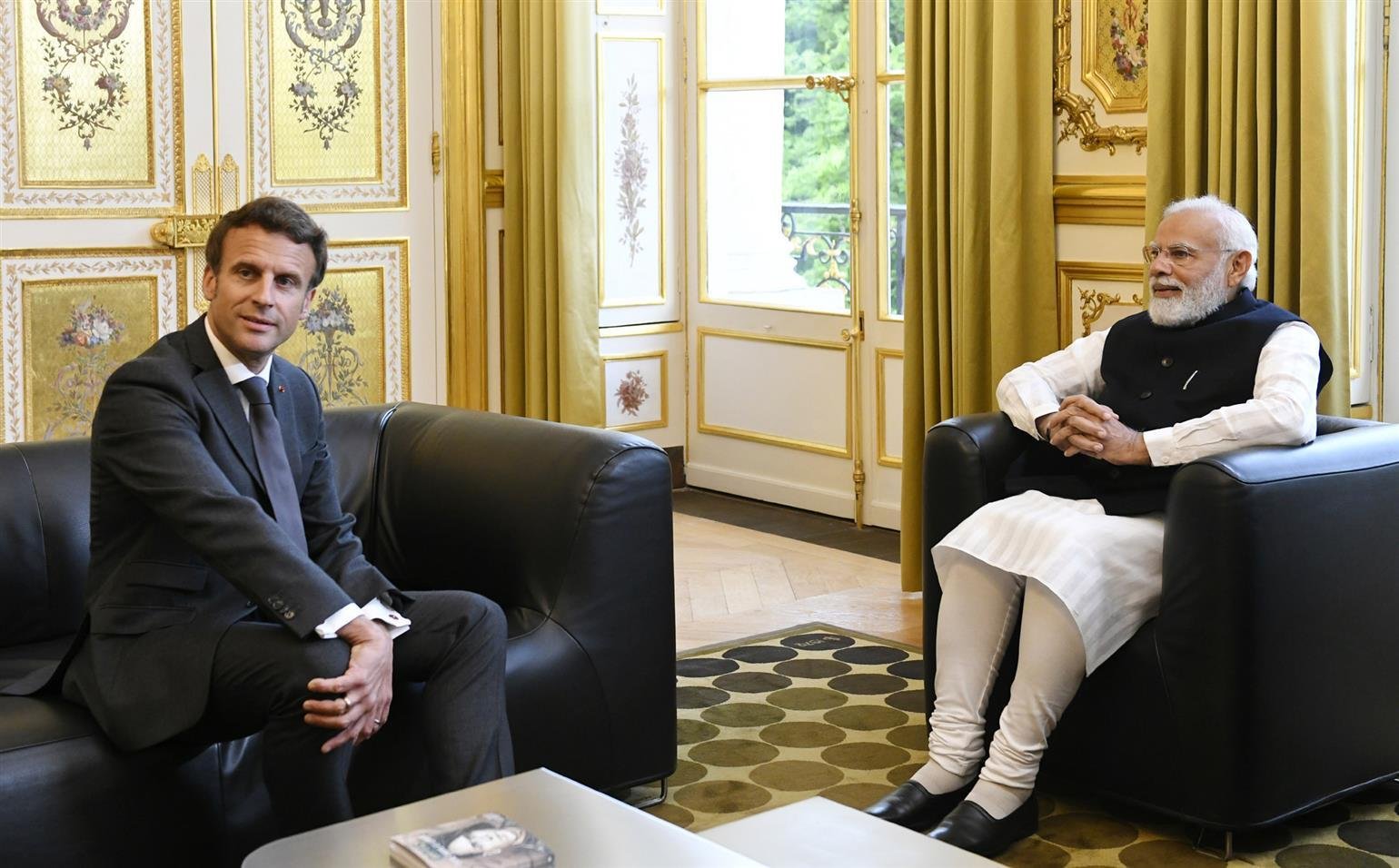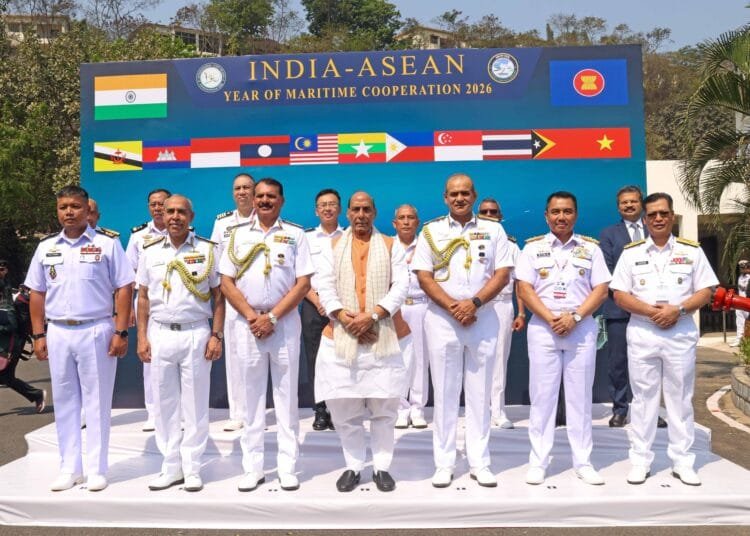India-France have strengthened cooperation between their cyber security agencies
The technology transfer from France to India in the construction of six Scorpene submarines at MDL in Mumbai underscored the long-standing armament cooperation and is testimony to the mutual trust between the two sides, says a Joint Statement after the visit of Prime Minister Narendra Modi to Paris.
“The six Scorpene submarines built at MDL in Mumbai illustrates the level of transfer of technology from France to India, in line with the “Make in India” initiative,” said the Statement issued on 4 May after Modi and President Emmanuel Macron held meeting on bilateral ties.
As seen in the timely delivery of the Rafale despite the pandemic, the two sides enjoy synergy in the field of defence. Taking forward this momentum, and based on their mutual trust, both sides agreed to find creative ways for France’s deeper involvement in the “Atmanirbhar Bharat” (Self-reliant India) efforts in advanced defence technology, manufacturing and exports, including through encouraging increased industry to industry partnerships.
Building on a great tradition of over 60 years of technical and scientific space cooperation, and in order to address the contemporary challenges that have arisen in space, in particular maintaining a secure access to space for all, India and France have agreed on setting up a bilateral strategic dialogue on space issues. It will bring together experts from space and defence agencies, administration and specialised ecosystem to discuss security and economic challenges in outer space, the norms and principles applicable to space as well as unveil new areas of cooperation. The two sides agreed to hold the first dialogue this year at the earliest.
In an increasingly digitalised world, India and France have strengthened cooperation between their cyber security agencies. Based on convergent outlook, they agree to join forces in promoting cyber norms and principles in order to counter cyber threats and agree to upgrade their bilateral cyber dialogue with a view to contributing to a peaceful, secure and open cyberspace.
The two sides have launched a number of initiatives to connect their Start-up ecosystems and welcome recent public-private engagement to work together, based on their respective successes, on building standards and protocols for free, inclusive, innovative and open public digital infrastructure and solutions to transform the lives of the people and for the larger global good.
India will be the first Country of the Year at this year’s edition of Vivatech, Europe’s largest digital fair, in Paris.
Building upon the implementation of the Indo-French roadmap on cyber security and digital technology, India and France reiterate their willingness to deepen their cooperation on exascale technology, based upon the fruitful collaboration between C-DAC and ATOS, which includes making supercomputers in India. The two sides also agree to work together for more secure and sovereign 5G/6G telecom systems.
Both sides reaffirmed the commitment to the success of the strategic Jaitapur EPR project for access to reliable, affordable and low carbon energy, and welcome the progress achieved over the last months. They will increase the contacts in the coming months to achieve new progress.
Seven years after the adoption of the Paris Agreement and the joint launch of the International Solar Alliance, India and France’s commitment to tackle climate change is stronger than ever, both on mitigation and adaptation. As renewable energy development is one of the key solutions for this transition, India and France reiterate their continued support to the objectives of the International Solar Alliance.
India and France also agreed to explore opportunities to jointly work on just energy transition pathways including under G7 to accelerate the deployment of renewables and access to affordable and sustainable energy.
Going a step forward in this commitment to clean energy, India invited France to participate in its initiative to make India a Green Hydrogen Hub under its National Hydrogen Mission.
Both sides are eager to foster cooperation on decarbonized hydrogen, including on aspects related to regulation, certification and standardization of such hydrogen in order to build robust industrial partnerships and agreed to soon finalise a roadmap to take forward this cooperation.
Both sides will work together to set up industrial partnerships to reinforce their own solar energy production capacities in order to supply Asian and European markets, with an integrated supply chain.
India and France welcomed the efforts made by AFD and India Exim Bank to step up their support to sustainable finance in the Indo-Pacific region and agreed to intensify their cooperation in this area. The “Indo-Pacific Parks Partnership” adopted in February this year, displays both sides’ common ambition to promote a sustainable approach in the Indo-Pacific region through the development of protected areas and natural parks.
India and France’s common ambition to fight against plastic pollution has been key to UNEA’s recent progress and decision to launch negotiations on a legally-binding international agreement on plastic pollution addressing the full life-cycle of plastics. India and France will continue to jointly promote the adoption of a strong and ambitious legally binding instrument to end plastic pollution, while respecting the principle of national circumstances and capability in taking actions to address plastic pollution. Both sides also called for immediate collective voluntary actions by countries to tackle plastic pollution on an urgent and continual basis.
India and France welcomed France’s commitment to India’s sustainable urban development, biodiversity, energy transition and other climate related projects through the AFD group and other agencies.
India and France expressed satisfaction at the adoption of the bilateral roadmap on Blue Economy and Ocean Governance and committed to accelerating its implementation.
India and France will jointly support progress of the Intergovernmental Conference on an international legally binding instrument under the UNCLOS on the conservation and sustainable use of marine biological diversity of areas beyond national jurisdiction (BBNJ), a key step to ensure protection of the high seas.
Both sides will continue to work jointly to increase the mobility of students, graduates, professionals and skilled workers while strengthening their efforts to combat irregular migration. Recognizing the benefit of bilateral student mobility, France maintains the objective of 20,000 Indian students by 2025 which will create opportunities for new businesses, start-ups and innovation between the two countries. fiinews.com










